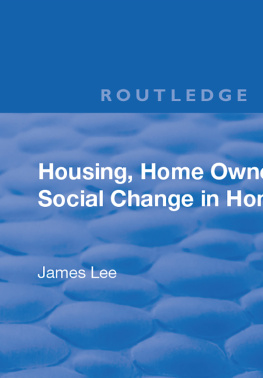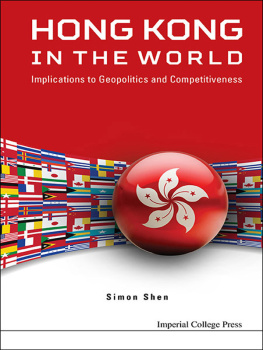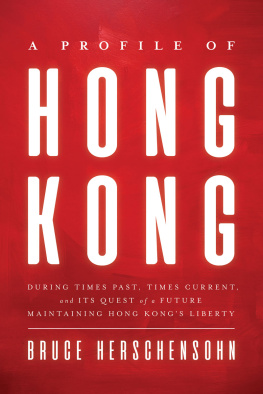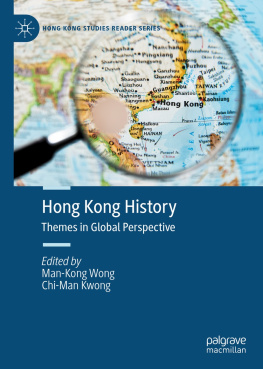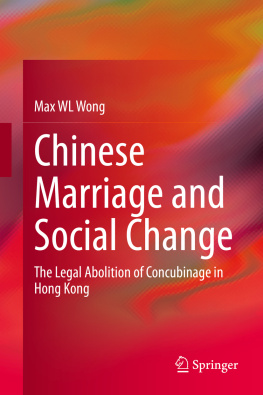Housing, Home Ownership and Social Change in Hong Kong
For Angela & Lyndon
First published 1999 by Ashgate Publishing
Reissued 2018 by Routledge
2 Park Square, Milton Park, Abingdon, Oxon, OX14 4RN
52 Vanderbilt Avenue, New York, NY 10017
Routledge is an imprint of the Taylor & Francis Group, an informa business
Copyright James Lee 1999
All rights reserved. No part of this book may be reprinted or reproduced or utilised in any form or by any electronic, mechanical, or other means, now known or hereafter invented, including photocopying and recording, or in any information storage or retrieval system, without permission in writing from the publishers.
Notice:
Product or corporate names may be trademarks or registered trademarks, and are used only for identification and explanation without intent to infringe.
Publishers Note
The publisher has gone to great lengths to ensure the quality of this reprint but points out that some imperfections in the original copies may be apparent.
Disclaimer
The publisher has made every effort to trace copyright holders and welcomes correspondence from those they have been unable to contact.
A Library of Congress record exists under LC control number: 99076349
ISBN 13: 978-1-138-34058-9 (hbk)
ISBN 13: 978-0-429-44057-1 (ebk)
Unemployment Rates in Hong Kong (%)
Hong Kongs Gross Domestic Product
Private Domestic Housing Stock by Vacancy and Class
The Changing Industrial Distribution of the Working Population
Value of Trade between Hong Kong and China, 1977-1997 (In Hong Kong $ million)
Comparing House Prices and Rental Indices
Monthly Income from Main Employment of the Labour Force
Household Number by Type of Tenure 1996
Housing Supply in the Public Sector 1988-1998
Comparison of Housing Stock
Housing Supply in the Private Sector and Inflation (CPI-A)
Socio-economic Groupings and Housing Tenure in Hong Kong (in percentage) 1976, 1986 and 1991
Housing Tenure and Occupational Class 1996 60
Distribution of Bank Loans (In Hong Kong $ million)
Housing Affordability
Housing Affordability Ratio An International Comparison
Existing Perspectives on Home Ownership
A Cultural Perspective on Home Ownership
Revenue from Land Sales (1970-1998)
The Hong Kong Class Structure
Selected Profile of Households having Capital Gains from Home Ownership in 1994 (In Hong Kong $)
This book is an outgrowth of my doctoral studies in the then School for Advanced Urban Studies (SAUS) in the University of Bristol. As a postgraduate student, it was probably one of the best intellectual environments I have ever come across. Some of the themes I developed in this book benefited enormously from those seminars I was fortunate enough to attend in the early 1990s at SAUS.
There are a number of people to whom I feel particularly indebted. Professor Ray Forrest is my mentor and a close friend who patiently guided me through the maze of urban policy and housing research. Professor Alan Murie, whose incisive criticisms as my external examiner and my subsequent engagements with him in the City University of Hong Kong provided me with tremendous insights into the relationship between state, society and housing. Professor James Midgley of Berkeley, University of California, my former teacher in LSE, who has never failed to encourage me to publish.
Special thanks must go to a few best friends who helped me enormously in one way or the other in coming to terms with publishing this book. K.W. Chan, whose knowledge in housing sociology and information technology has encouraged me to take on the challenge of submitting a manuscript. T.K. Lee provided me with constructive comments on my early manuscript. There are a number of best friends, Hans Meusen, Paul Burton, Chris Lambert and Tricia Kennet, whose friendship has enabled me to suffer less from those doctoral diseases.
I am extremely grateful for editorial help from my friend Margaret Yau, and Yau Man Siu who kindly volunteered to edit my earlier drafts.
Finally, I am deeply indebted to my family for their support. Without them, this project would have been impossible.
Unless otherwise specified, all currency referred to in the book is in Hong Kong dollars (HK$)
1 British Pound = approximately HK$12.5 in 1999
1 US dollar = approximately HK$7.75 in 1999
Part One
THEORY AND METHOD
This study starts with three simple observations of the housing scene in Hong Kong in the recent two decades. First, house price inflation in Hong Kong has been extremely phenomenal. At the peak in mid-1997, average house price of a 500 square feet flat was 15 times of the price in 1980. Even after the Asian economic crisis, house price in mid-1999 is still twice as much as houses in the Silicon Valley, the most expensive house price regime in USA. Why is there such phenomenal growth in house prices? Second, while housing is not affordable for many, Hong Kong sees many middle class people craving for home buying, mobilizing all kinds of financial resources they can lay their hands on, including hard earned money from their parents. Third, buying and selling of homes has become an extremely important part of middle class life in Hong Kong. Many people have made substantial capital gains through home purchase. There are claims that in Hong Kong everyone is addicted to a home buying culture. To what extent are these observations true and what are their social implications?
These initial observations on the Hong Kong housing system form the basis of the current study. However, the rationale of the study emanates from a fundamental concern with the way housing studies have hitherto been developed. Over the last three decades, housing sociologists have developed keen interest in identifying social processes underlying housing development. Their interests have largely been concerned with the way growth in home ownership has affected consumption and social divisions. One of the key theoretical arguments put forth is that mass home ownership represents a new social division. While this theoretical debate has somehow subsided in recent years, its influence on home ownership studies could not be neglected. This book argues that contemporary housing research has adopted a rather narrow and confining focus, to the extent that it has effectively neglected a number of important social processes, for example, the role of the family, cultural values, and their relation to home ownership. Housing studies rarely confront the question of place-boundedness, which implies that the housing system represents the result of a complex system of interactions between the individual, the family, the state, the housing market and the society over time. Housing theories were often applied uncritically across national boundaries, to the extent that they hindered the development of a fuller body of research - one that is more sensitive to local culture and specificity (Williams, 1983; Ball, Harloe & Martens, 1988). Although some researchers have sought to remedy this deficiency at some point, development to this end has remained relatively weak (Dickens, Duncan, Goodwin & Gray, 1985, Forrest & Murie 1995).
One purpose of this study is to bring back the discussion of the role of family and culture into the main stream discussion of home ownership and social change. In this respect, Hong Kong is taken to be a case analysis since the city offers a good example of cultural and institutional diversity between the East and the West. This then leads us back to the primary focus of this book - home ownership and social change. The transformation of Hong Kong from a predominantly public rental tenure to burgeoning home ownership represents the most dramatic post-war social change. The shifting tenure and the vibrant housing market have profoundly transformed Hong Kongs urban structure and the political economy. Anyone walking around the Eastern District, Hong Kong Island, or strolling along the promenade of Tsim Sha Tsui, Kowloon Peninsula, could easily notice the massive urban transformation of the built environment. This book explores how the growth of owner-occupation in recent decades have been affected by both societal and policy shifts. How owner-occupation as an emerging tenure has impacted upon social life and opportunities? How individual housing experiences have come to be shaped by societal forces? In sum, it is about the complex relationship between a shifting housing sector within a rapidly changing society.

